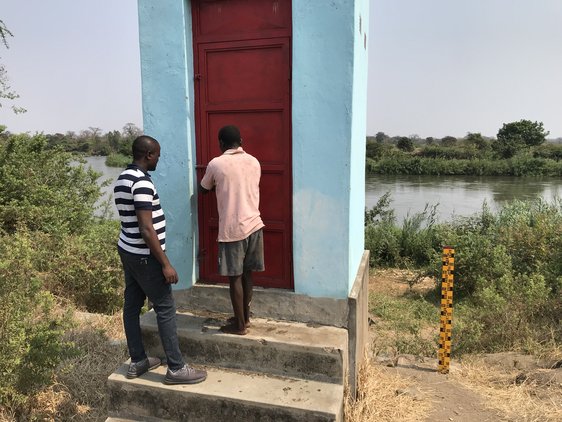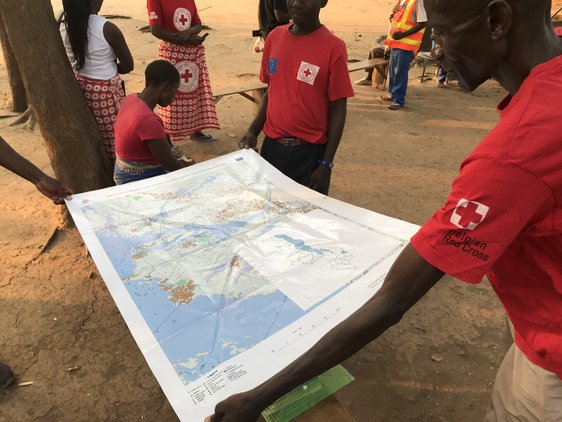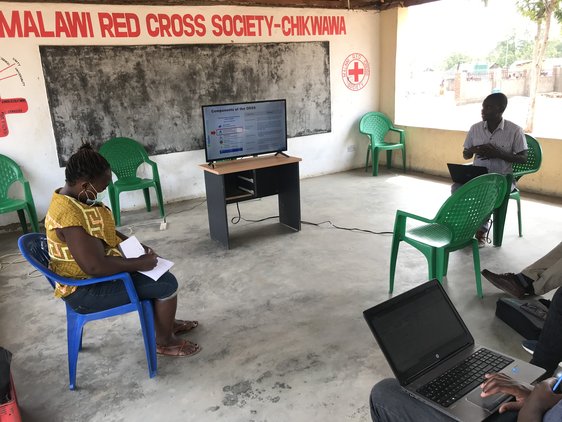Categories
Forecast-based Action in Malawi
Since 2017 the Malawi Red Cross Society (MRCS), with support from the Danish Red Cross (DRC), have aimed to develop triggers and implement anticipatory actions for floods in corporation with governmental stakeholders by building on their solid experience on early warning systems and response.
Project objective
The project aims to reduce the impacts of floods in vulnerable communities through implementation of pre-agreed anticipatory actions triggered by forecasts from the Operational Decision Support System (ODSS).
Key facts
Start/end date
Start date: 2017
Hazards covered
Floods
Regions covered
Southern Malawi - Lower Shire river basin
Early action sectors
Being updated
Anticipatory Action Protocols/Plans in place
Flood EAP under development
Activations
Activation in March 2019-floods (as a part of a larger response)
Population reached during activation
Reached population in March 2019-response: 14.000 HH
Key actors/implementing partners
Malawi Red Cross Society | Danish Red Cross | 510 | RCCC | Department of Disaster Management | Department of Water Resources | Department of Climate Change and Meteorological Services | Department of Economic & Planning
Other partners: WFP
Project impressions

Automatic river gauge at Shire @ Matope which feed into the Operational Decision Support System which covers the Lower Shire river – The manual river gauge reader (opening the door) register the water levels two times a day, © Søren Bøge (DRC delegate)

Community-based Disaster Response Team in the district Chikwawa – the volunteers are trained in DRM, first aid and search & rescue, PASSA, early warning and cash. Ready to be activated if floods are forecasted in their area, © Søren Bøge (DRC delegate)

FbA national task force members on field visit in flood-prone Chikwawa ahead of the 2020/2021 rain season – learnings from the field visit is being used in the development of triggers and especially anticipatory actions © Søren Bøge (DRC delegate)

Automatic river gauge at Shire @ Matope which feed into the Operational Decision Support System which covers the Lower Shire river – The manual river gauge reader (opening the door) register the water levels two times a day, © Søren Bøge (DRC delegate)
Community-based Disaster Response Team in the district Chikwawa – the volunteers are trained in DRM, first aid and search & rescue, PASSA, early warning and cash. Ready to be activated if floods are forecasted in their area, © Søren Bøge (DRC delegate)
FbA national task force members on field visit in flood-prone Chikwawa ahead of the 2020/2021 rain season – learnings from the field visit is being used in the development of triggers and especially anticipatory actions © Søren Bøge (DRC delegate)
Anticipation in practice: Project description
IPCC’s Fifth Assessment Report identifies Malawi as a country of high risk to adverse effects from climate change. Thus, natural disasters such as floods, which already hit the country regularly, are likely to become more frequent. Malawi annually experiences multiple smaller floods in the rainy season from November to April, but more than 19 major floods have occurred in recent decades. According to the Malawian Department of Disaster Management, floods appear to be increasing in frequency, magnitude, and scope.
Since late 2017, MRCS has been working in partnership with DRC to establish an FbA mechanism for floods in two traditional authority areas in Chikwawa and Nsanje districts. MRCS and DRC also partner with three key line departments in the Government of Malawi in developing the FbA for floods in the lower Shire river basin: the Disaster Management Affairs (DoDMA) coordinates and chairs the national FbA taskforce; the Climate Change and Meteorological Services (DCCMS) produces climate & weather forecasts and flash flood warnings; and the Water Resources (DWR) department provides flood modelling & riverine flood forecasts. Furthermore, the taskforce is also promoting the institutionalization of FbA into existing structures and systems to ensure sustainability.
Riverine flood forecasts with 72-hour lead time are provided by the Operational Decision Support System (ODSS) that was established through the World Bank-funded Shire River Basin Management Programme and is technically managed by DCCMS, DWR & DoDMA. The alerts and warnings are issued by DCCMS (flash) or DWR (riverine) and disseminated from national to district level by DoDMA.
During the floods in March 2019, FbA funds were released for MRCS National Response Teams, Community Early Warning System teams, and Community Disaster Response teams to be mobilized to disseminate messages on warnings and recommended actions to most at-risk communities. Anticipatory actions included how to protect lives and livelihood assets and how to evacuate to evacuation centers. Although not implemented in 2019, unconditional cash transfers are also being considered. Ahead of the 2020-2021 rain season, MRCS, DRC and the national FbA taskforce is reviewing which anticipatory actions that should be part of SOPs and the MRCS contingency plans.
Outcomes and lessons learnt
The evaluation of the 2019-flood response was not in a position to measure the direct benefits of FbA, but feedback from multiple sources indicates MRCS’ anticipatory actions were able to achieve a great deal in limited time with only limited financial inputs. This was partly because of pre-existing branch preparedness but mainly due to the introduction of cash at district level in the days following the warning.
The ODSS lead-time is 72 hours for riverine floods. Under the draft SOP, the primary anticipatory action, a one-off multi-purpose cash transfer to vulnerable households on the government’s Social Cash Transfer Programme (SCTP), was supposed to be delivered by the financial service provider to pre-registered beneficiaries within 24 hours. This, in reality, was not possible. It has since been determined that 60 to 72 hours is more realistic (if it does not fall over a weekend or public holiday). The FbA taskforce is therefore reviewing the SOPs and which anticipatory actions to prioritize going forward.


